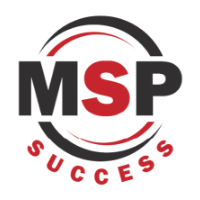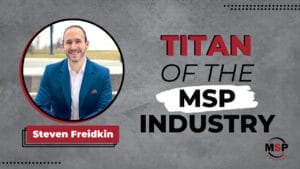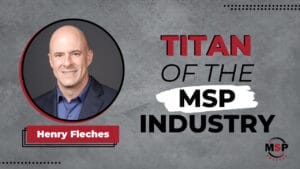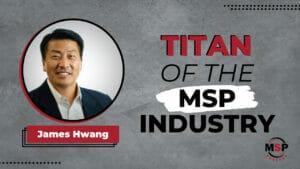For Mike Chaput, Work Culture Is A Key Indicator To How Successful An MSP Will Become, In Addition To Being A Foundational Component For Warding Off The Effects Of Inflation
Note: This article is taken from a live interview and has been edited for clarity and length.
Mike Chaput, president and CEO of Endsight, understands the value of his workforce. He says they sometimes even refer to themselves as a farm company, where they develop talent from the ground up and create superstars. It’s imperative to the success of his business, he says, to make sure employees are happy and growing, especially as inflation reaches unimaginable heights.
Robin Robins, founder of MSP Success Magazine, spoke with Mike to understand how employees are helping to curb the effects of rising costs, as well as where MSPs should be focusing their investments. According to Mike, it’s in security and peer groups.
Robin Robins: Endsight is an MSP based in Northern California, with two locations doing about $32 million in revenue and growing fast. Tell us a little bit about your business, Mike.
Mike Chaput: We have a couple vertical markets; one is big in the wine industry. We also have about 25% of the business in legal services. The rest of the business, which is more than half of it, covers a wide variety of companies. Most of our customers are less than 150 employees. Companies pay us a fixed monthly fee based on the number of users we support to cover functions like the help desk function, the sys admin function, the IT manager function and the security function. In rare cases we move up that stack into the CIO, but I think we use that term way too loosely in the industry. We’ll have some kind of focused service where we’ll provide true CIO services, but that’s kind of rare. And we do all the kind of classic stuff you would think, like handling backup and all those utility services around it. And we also are kind of classic in that we don’t really have non-managed services clients, so we do professional services, deployments, projects, but it’s for the managed services base.
Robin: How have inflation and labor shortages, among other current challenges, impacted you?
Mike: The first logical way for me to think about the current challenges is in the talent market. We think about talent as a marketplace, where we’re competing for the best people. So, we think about it in terms like, “What is our brand promise to them? What do they get from us besides money? How do we create value for the people who work for us? And what do we have to uniquely offer?” It’s really about career development, opportunity, learning and growth, as well as a very well-behaved culture. How do we create value in their lives both at work and outside of work and then try to find like-minded people who are looking for what we provide?
The reason I started that challenge question with the talent is because I won’t say inflation takes care of itself, but if you have a very talented team, you’re in a much more stable position to go to your clients and explain to them about inflation, and that means price increases to you. You do that with conviction. The strategy is to keep your talent first, as a fundamental, foundational piece.
Robin: What do you think are some of the challenges that a lot of MSPs have to be looking at and thinking about as we move into this year and beyond?
Mike: That’s a very broad question and I think it’s super unique to the MSP and where they’re at with their life cycle. But what I see out there for the industry, which is mostly a much smaller set of companies, is that scale is starting to really matter in our space. For a long time, it was fine to be five people, eight people, but in the modern climate, you need a CISO on your team and you need a developed security offering. I talked to one person who said, “Yeah, but an MSSP is like flying a plane and an MSP is like driving a car.” And my response to him was, “Well, I feel like I was driving a car and then all of a sudden I was in the air.” If I don’t put wings on the car, we’re just going to crash into the earth, right? Some of these things just require scale. On one side, that’s a challenge, but on the other side, it’s a huge opportunity, because if you can figure it out and you can scale, you can have that kind of competitive advantage.
Robin: Let’s turn a little bit to opportunity. In the $1 to $5 million range, where do you feel like the opportunities are?
Mike: I think a couple of trends are at play here that are worth just talking about specifically. One of them is security. People weren’t willing to spend the money on it. Now they’re directing their budget to risk. And it’s all new revenue. All new sources of profit. That’s just for our industry infrastructure. And the industry is trying like mad to build all the tech and services to support all this new desire for spend. It’s definitely a swim lane that opens up an enormous amount of revenue. And that revenue for the smaller MSPs might look like a partnership with somebody who specializes in it or a third party.
And the second trend – and they’re connected, I believe – is that the market for traditional MSPs is expanding upward. So, the size category of customers that are interested in outsourced services like a help desk, sysadmin, IT management – that market is growing. Let’s say people who are considered mid-market with small teams are thinking, What can I outsource? Can I outsource security at least? And that’s why I say they’re connected, because most of them don’t trust their internal IT departments to be their MSSP as well. So, they’re at least outsourcing that. Because a lot of security is just blocking and tackling in terms of the systems, administration and maintenance. And so, you know, life cycle management. It’s like a rising tide that should lift all ships. And so there are a couple trends. One, mid-market moving into our traditional space, creating vacancies. There are a whole bunch of other factors, but I think that’s kind of the nature of the opportunity now.
Robin: I’ve heard a lot of talk about using AI to be more efficient in the help-desk space – are you using that? Do you see that as an opportunity?
Mike: At this point I am bullish on the long-term ability for AI in our industry, but not super bullish on it. I think it’s going to affect the middle layer of our technical talent. I don’t think AI is going to be able to replace the experts. But, let’s say by 2028, maybe AI will be significantly better than it is now. But my thinking is to wait until things get mature and it starts to become standard, then adopt, because otherwise you’ll be chasing your tail.
Robin: Is there anything else we haven’t touched on that you think is important for people to keep in mind?
Mike: There are several things we could get into. We could talk about disciplines, like peer groups, financial discipline, operational discipline. But the chief place to start is with peer groups to really cultivate accountability at the leader level. So, find a peer group that measures very specific financial targets and metrics and manages to those, properly accounting for the leadership’s time and making sure the business has a tangible value outside of it just being a job for the leader. If you’re not in a peer group, I just don’t know of another way of spending time and money that has a higher expected return if you go there with an open mind. So, I’m a big, big fan of the peer groups, and now they’re everywhere.
And then there’s operational discipline, because it’s very different than technology. It isn’t easy to hire somebody to lead all the operational structure. It’s something I see missing in a lot of younger managed services providers, which is some sort of structure around operational discipline. And that’s different than technical service delivery. So, it’s not how well you know how to set up windows. It’s about how well you can build process and manage the result and replicate it across new team members.







